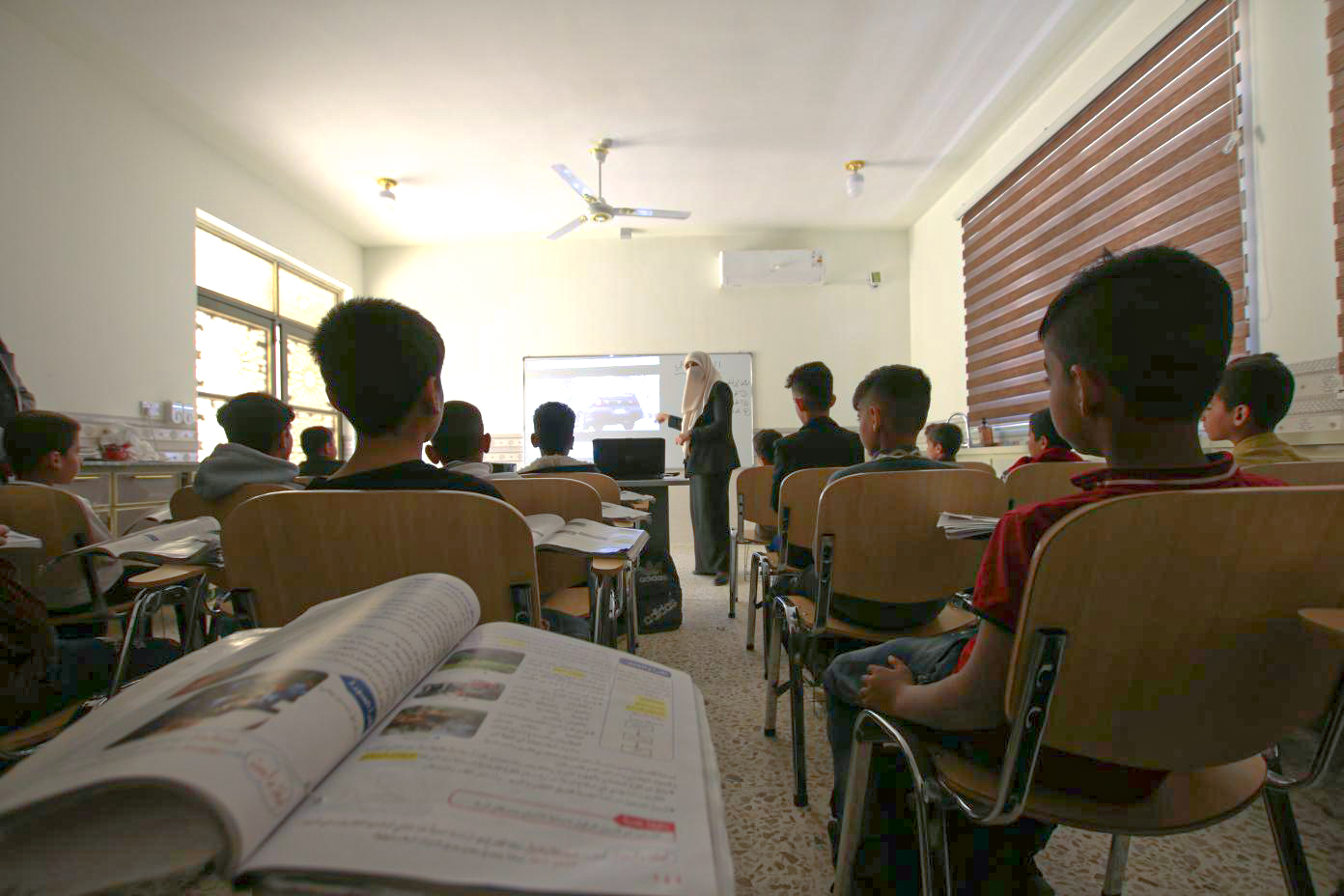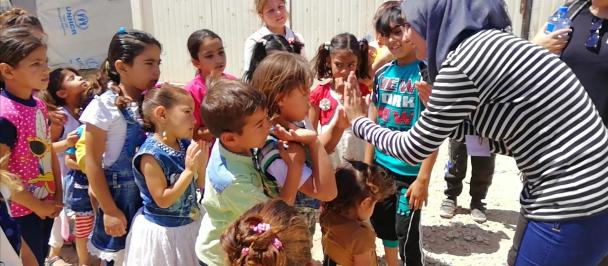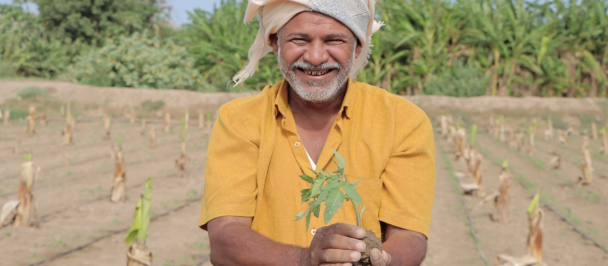Investing in education, investing in Iraq’s future
January 23, 2023

Using videos, a teacher at Mujahid al-Arabi Primary School tries to explain complex concepts to her students.
Mujahid al-Arabi Primary School is slowly regaining life less than a year after its reopening. Once empty, dilapidated, and abandoned because of the war, its rooms are now full of children who are all eager to learn. With over 400 students, its corridors and playgrounds often get busy. Groups of children flock to read, play football, or just hang out together.
The school’s facilities have improved too. Its rooms are now air-conditioned and well-ventilated; boards covered in colorful, educational posters; desks and chairs brand new; hallways, staircases, and toilets clean and shiny; library filled with books; safe drinking water available everywhere.
Mujahid Al-Arabi Primary School has become a safe haven for budding poets, scientists, engineers, doctors, as well as for its hardworking teachers and staff.
“It feels nice to be back in school,” says 12-year-old Saif Saad Fadhel, whose primary interest is solving math problems. “Every day I am learning something and building a stronger bond with my friends through school.”
Enjoying their new classroom, desks, and chairs, Saif and his friends are thrilled to start every day’s lesson.
The atmosphere at the faculty room and administrative building also changed a lot. Teachers’ and staff’s spirits are high. The pleasant school environment and new facilities clearly made a big difference.
During the ISIL conflict, schools were heavily damaged. Many young Iraqis were forced to either drop out of school or continue studying at home or in overcrowded make-shift classrooms.
Mohammad Qusay Mohammad, 13, remembers how Mujahid al-Arabi Primary School looked after the conflict. “The school was falling apart. Most of it was destroyed. We could not use it for classes.”
“Students and teachers feel better and more motivated to go to school. Everyone is happy and proud of their school. Even parents have noticed this remarkable shift in their children’s behaviours.” Rasheed Ubaid Zedan, Mujahid al-Arabi Primary School's principal
The halls of Mujahid al-Arabi Primary School in al-Karma, Anbar after rehabilitation.
Determined to finish his studies and be a teacher, Mohammad, like most children in al-Karma district within Anbar, attended classes in makeshift classrooms called caravans. “There were no desks. There were too many of us in one caravan. Studying was difficult.”
To make their students feel a little more comfortable, Islamic Studies teacher Ali Jabbar Mohammad and his co-teachers converted their homes into classrooms. But the space was still not conducive for learning. The crowded space and strong background noise distracted kids and made it difficult for lessons to sink in.
Mohammad and Ali’s hopes were renewed when the school’s rehabilitation commenced. Every week Mohammad made sure to pass by and spend time admiring his school as engineers, carpenters, and masons worked to upgrade it. “I watched it while being rebuilt. I am amazed at how it turned out.”
With facilities and equipment modernized, Ali sees a bright future for his school and expects children to do their best and teachers to perform well. “The coming years are going to be good. Everyone loves their new school. I am excited to see how this upgrade would create ripples of positive effect on children’s learning and their future.”
Every week, Ali delivers at least 12 lectures to the 50 students he handles.
For Hifdhi Hameed Rashid, manager of the Department of Education in al-Karma, rebuilding schools is critical, but it is just the beginning. With more than 300 schools in Anbar (60 in al-Karma) damaged by the conflict, the work is far from over.
“The government keeps quality education as a priority. We will continue rehabilitating schools and building more classrooms, annexes, and examination halls to keep pace with the growing population. We will also equip schools with necessary supplies and work with educators to enhance the current system, curricula, and modules,” he says.
As of January, 207 schools in Anbar have been rehabilitated, 53 of which are in al-Karma. Across Iraq’s five liberated governorates, UNDP’s Funding Facility for Stabilization has rehabilitated 617 schools, 162 are in Anbar, including Mujahid al-Arabi Primary School.
“Education is the beacon that guides Iraq towards peace and development. Our children will define the future of Iraq. Through education, we can stir them into the right path and mold them into noble and uplifting leaders who value diversity and democracy." Hifdhi Hameed Rashid, manager of the Department of Education in al-Karma
January 24 marks the International Day of Education. With this year’s theme, “to invest in people, prioritize education,” UNDP rallies behind teachers and champions who work to transform education towards peace and sustainable development. Iraq used to have one of the best education systems in the Middle East. Primary education is compulsory and public education is free at all levels. However, decades of conflict caused the education system to deteriorate. UNDP Iraq is working with the Government of Iraq to rehabilitate schools. To date, UNDP’s Funding Facility for Stabilization has rehabilitated 396 primary schools, 199 secondary schools, 22 kindergartens, seven universities, and nine technical colleges. The rehabilitation of Mujahid al-Arabi Primary School for Girls and Boys in al-Karma was funded by the United States Agency for International Development (USAID).

 Locations
Locations
